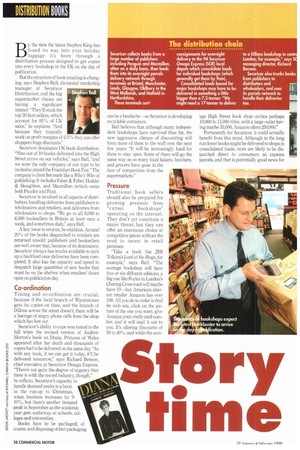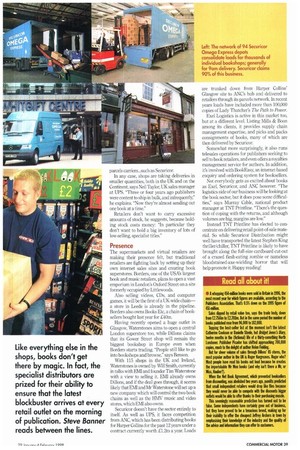DISTRIBUTION BOOKS
Page 42

Page 43

If you've noticed an error in this article please click here to report it so we can fix it.
Like everything else in the shops, books don't get there by magic. In fact, the specialist distributors are prized for their ability to ensure that the latest blockbuster arrives at every retail outlet on the morning of publication. Steve Banner reads between the lines.
By the time the latest Stephen King has found its way into your holiday luggage it's been through a distribution process designed to get copies into every bookshop in the UK on the day of publication.
But the structure of book retailing is changing, says Stephen Ball, divisional marketing
manager at Securicor Stephen Ball
Distribution; and the big supermarket chains are having a significant impact: "They'll stock the top 30 best-sellers, which account for 95% of UK sales" he explains. "And bemuse they typically work on profit margins of 2-3% they can offer shoppers huge discounts."
Securicor dominates UK book distribution. "Nine out of 10 books delivered into the High Street arrive on our vehicles," says Ball, "and we were the only company of our type to be invited to attend the Frankfurt Book Fair." The company's client list reads like a Who's Who of publishing. It includes Faber & Faber, Hodder & Stoughton, and Macmillan (which owns both Picador and Pan).
Securicor is involved in all aspects of distribution, handling deliveries from publishers to wholesalers and retailers, and deliveries from wholesalers to shops. "We go to all 8,000 to 8,500 booksellers in Britain at least once a week, and sometimes daily," says Ball.
A key issue is returns, he explains. Around 20% of the books dispatched to retailers are returned unsold: publishers and booksellers are well aware that, because of its dominance, Securicor always has trucks available to pick up a backload once deliveries have been completed. It also has the capacity and speed to despatch large quantities of new books that must be on the shelves when retailers' doors open on publication day.
Co-ordination
Timing and co-ordination are crucial, because if the local branch of Waterstones gets its copies on time, and the branch of Dillons across the street doesn't, there will be a barrage of angry phone calls from the shop which has lost out.
Securicor's ability to cope was tested to the full when the revised version of Andrew Morton's book on Diana, Princess of Wales appeared after her death and thousands of copies had to be delivered on the same day "As with any book, if we can get it today, it'll be delivered tomorrow," says Richard Benson, chief executive at Securicor Omega Express. "There's not quite the degree of urgency that there is with the record industry, though," he reflects. Securicor's capacity to handle demand peaks is a boon in the run-up to Christmas, when business increases by 910%, but there's another demand peak in September as the academic year gets underway at schools, colleges and universities Books have to be packaged, of course, and disposing of that packaging can be a headache—so Securicor is developing recyclable containers.
Ball believes that although many independent bookshops have survived thus far, the new aggressive climate of discounting will force more of them to the wall over the next few years: "It will be increasingly hard for them to stay open. Some of them will go the same way as so many local bakers, butchers, and grocers have gone in the face of competition from the supermarkets."
Pressure
Traditional book sellers should also be prepared for growing pressure from "virtual bookshops" operating on the internet. They don't yet constitute a major threat, but they can offer an enormous choice at competitive prices without the need to invest in retail premises.
"Take a book like JRR Tolkien's Lord of the Rings, for example," says Ball. "The average bookshop will have five or six different editions; a big one like Foyles in London's Charing Cross road will maybe have 10—but American internet retailer Amazon has over 100. All you do to order is find its web site, click on the picture of the one you want, give Amazon your credit card number, and it will mail it out to you. It's offering discounts of 20 to 40%; and while the aver
age High Street book shop carries perhaps 10,000 to 15,000 titles, with a large outlet having maybe 35,000, Amazon offers 250,00a" Fortunately for Securicor, it could actually benefit from this trend. Although in the long run fewer books might be delivered to shops in consolidated loads, more are likely to be dispatched direct to consumers as express parcels, and that is potentially good news for parcels carriers...such as Securicor.
In any case, shops arc taking deliveries in smaller quantities, both in the UK and on the Continent, says Neil Taylor, UK sales manager at UPS. "Three or four years ago publishers were content to ship in bulk, and infrequently," he explains. "Now they're almost sending out one book at a time."
Retailers don't want to carry excessive amounts of stock, he suggests, because holding stock costs money: "In particular they don't want to hold a big inventory of lots of low-selling, specialist titles."
Presence The supermarkets and virtual retailers are making their presence felt, but traditional retailers are fighting back by setting up their own internet sales sites and creating book superstores. Borders, one of the USA's largest book and music retailers, plans to open a vast emporium in London's Oxford Street on a site formerly occupied by Littlewoods.
Also selling videos, CDs, and computer games, it will be the first of a UK-wide chain— a store in Leeds is already in the pipeline. Borders also owns Books Etc, a chain of booksellers bought last year for £40m.
Having recently opened a huge outlet in Glasgow, Waterstones aims to open a central London superstore too, while Dillons claims that its Gower Street shop will remain the biggest bookshop in Europe even when Borders starts trading. "People still like to go into b(x)kshops and browse," says Benson.
With 113 shops in the UK and Ireland, Waterstones is owned by WH Smith, currently in talks with EMI and founder Tim Waterstone with a view to selling it. EMI already owns Dillons, and if the deal goes through, it seems likely that EMI and Mr Waterstone will set up a new company which will control the two book chains as well as the HMV music and video stores, which EMI also owns.
Securicor doesn't have the sector entirely to itself. As well as UPS, it faces competition from ANC, which has been distributing books for Harper Collins for the past 12 years under a contract currently worth £1.2m a year. Loads are trunked down from Harper Collins' Glasgow site to ANC's hub and delivered to retailers through its parcels network. in recent years loads have included more than 100,000 copies of Lady Thatcher's The Path to Power.
Exel Logistics is active in this market too, but at a different level. Listing Mills & Boon among its clients, it provides supply chain management expertise, and picks and packs consignments of books, many of which are then delivered by Securicor.
Somewhat more surprisingly, it also runs telesales operations for publishers seeking to sell to book retailers, and even offers a royalties management service for authors. In addition, it's involved with BookEasy, an internet-based enquiry and ordering system for booksellers.
Not everybody gets as excited about books as Exel, Securicor, and ANC however. "The logistics side of our business will be looking at the book sector, but it does pose some difficulties," says Murray Cable, national product manager at TNT Printline. "There's the question of coping with the returns, and although volumes are big, margins are low."
Instead TNT Printline has elected to concentrate on delivering retail point-of-sale material. So while Securicor Distribution might well have transported the latest Stephen King thriller/chiller, TNT Printline is likely to have brought along the full-size cardboard cut-out of a crazed flesh-eating zombie or nameless bloodstained-axe-wielding horror that will help promote it. Happy reading!
The distribution chain
Securicor collects books from a large number of publishers including Penguin and Macmillan, often on a daily basis, then feeds them into its overnight parcels delivery network through terminals at Bristol, Manchester, Leeds, Glasgow, Oldbury in the West Midlands, and Hatfield in Hertfordshire.
These terminals sort consignments for overnight delivery to the 94 Securicor Omega Express (SOE) local depots which consolidate loads for individual bookshops (which generally get them by 9aml. Consolidated loads bound for major bookshops may have to be delivered in something a little bigger than a 7.5-tanner. "We might need a 17-tonner to deliver to a Dillons books* in centr London, for example," says 5 managing director, Richard Benson.
Securicor also trunks books from publishers to distributors and wholesalers, and uses its parcels network to handle their deliveries too.
Read all about it!
A whopping 4M-million books were sold in Britain in 1996, the most recent year for which figures are available, according to the Publishers Association. That's 0,5Y, down on the 1995 figure of Sales dipped by retail value too, says the trade body, dawn from E2.756bn to f2.701bn. But in the same period the number of books published rose from 96,000 to 102,000.
Topping the best-seller list at the moment isn't the latest Catherine Cookson or Danielle Steele. but Bridget Jones's Diary. twelve months in the (fictional) life of a thirty-something North Londoner. Publisher Picador has shifted approaching 700,000 copies, much to the delight of author Helen Fielding.
But for sheer volume of sales through Dillon' 85 stores, the most popular author in the lB is Roger Hargreaves. Roger who? Most people have read his books out loud because he creates the imperishable Mr Men books (and why isn't there a Mr, or Miss, Haulier?).
When the Net Book Agreement, which prevented booksellers from discounting, was abolished two years ago, pundits predicted that small independent retailers would drop like flies because they would never be able to compete with the discounts bigger outlets would be able to offer thanks to their purchasing muscle.
This seemingly reasonable prediction has tuned out to be false. Some independents have certainly gone out of business, but they have proved to be a tenacious breed. making up for their inability to offer the cheapest Jeffrey Archers in town by emphasising their knowledge of the industry and the quality of the advice and information they can offer to customers.












































































































